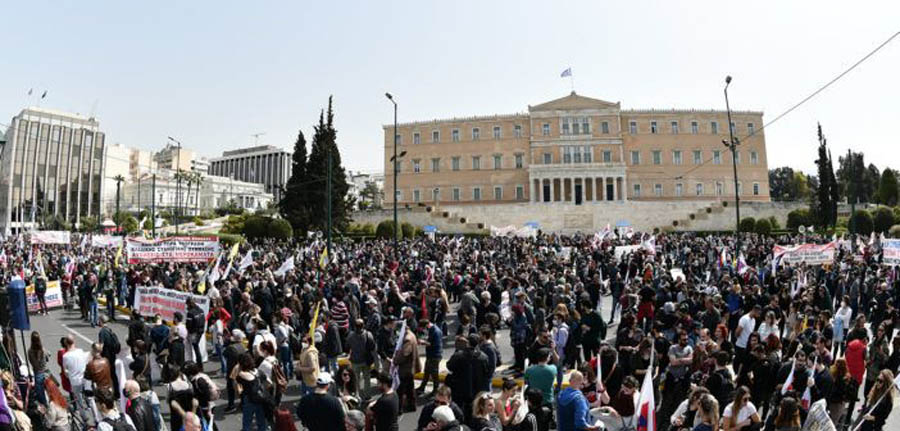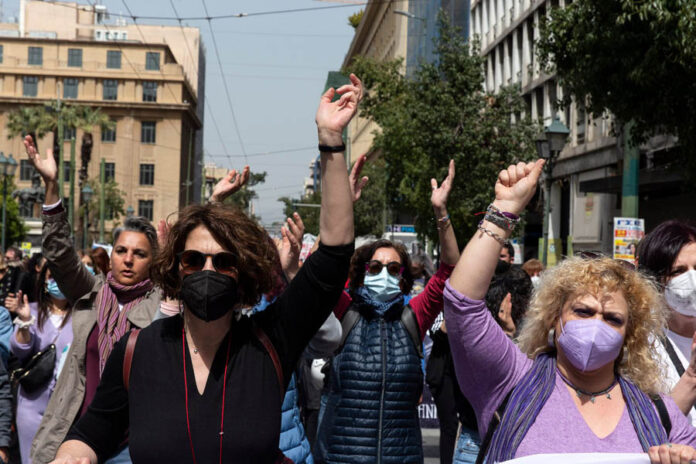We publish a slightly edited version, for international readers, of a statement by Xekinima, regarding the recent general strike in Greece
The April 6 general strike in Greece, called by the General Confederation of Trade Unions (GSEE) and the confederation of public sector unions (ADEDY) was an important step forward in the struggle against the New Democracy government. The participation in the strike but also the different strike demos called on that day were more massive and militant than those we have seen the previous years.
In Athens, the strike demonstration called by GSEE and ADEDY – which in previous strikes failed to gather more than a few hundred – had a few thousand workers. The picture was similar at the demos called by left-wing organisations (in Greece there is a sad tradition of different strike demos being called by different organisations…).
PAME’s rally (“Struggle front for all workers”, the Communist Party – KKE front) was probably the biggest of all.
In Thessaloniki the rallies were also massive. PAME’s anti-war rally was attacked with tear gas and some of its leading members got arrested by the infamous MAT (riot police), when they tried to enter the city’s port in order to stop a shipment of NATO arms to Ukraine.
In important workplaces, such as the large food industries, strike participation exceeded 90%. In the construction sector, large plants were also paralyzed. In urban transport and in the shipping industry, workers broke in practice the new anti-worker law, by refusing to give “safety quotas”, i.e. the required number of workers per workplace to remain on the job in order to ensure operations. Trolleybus workers in Athens ignored the court ruling that declared the strike illegal and participated in it en masse.
Boiling anger
The sweeping wave of price hikes in basic necessities, the soaring prices of electricity and fuel, the attack on the 8-hour working day and many other rights of workers by the ND government are now pushing broad layers of working-class people and wider social layers to the limit.
At the same time, the brutality of the war, but also the hypocritical face of the Greek government, which on the one hand fully aligns itself with its NATO allies, while on the other hand uses the war as an excuse for all the suffering experienced by Greek people, are revealed more and more each day.
The government is allowing private electricity providers to speculate to a provocative level behind the backs of the people. It is dismantling the national health system in the midst of a pandemic to advance the interests of large private clinics. It is completely selling off the country’s public assets. At the same time, ministers and pro-government journalists have the audacity to wag their fingers at the people by “explaining” that they can save money by turning off the lights and turning down the temperature in their homes – something they themselves will never have to do, of course. As for the usual argument that “money doesn’t grow on trees”, they bring it up time and again at every opportunity. Most recently, we were “reminded” of it by the governor of the Bank of Greece, G. Stournaras.

Trade union leaderships – behind the needs
Part of the simmering anger found expression in the strike of April 6.
This happened despite the fact that the leaderships of the big trade unions (GSEE, ADEDY), which are controlled by PASOK and New Democracy, didn’t do anything to build for the strike in the workplaces and effectively organise it. This is, after all, their usual practice. They leave major attacks on labour rights unanswered and when the situation reaches a breaking point, they call for strikes which are designed in such a way that they can’t be effective. They are blank shots in the air, instead of being an actual effort to stop the anti-worker attacks.
The trade union leaderships don’t organise discussions or campaigns at the workplace level and only occasionally pay for some radio messages. Their slogans are totally vague and inadequate. There is no plan on what should happen if the demands are not met. Based on this situation, and the record of the trade union tops which have on many occasions sold-off combative struggles and strikes, the mass of the working class is not convinced that they shall enter into battle.
Need for escalation
What the combative trade unions and the social movements should do is to try to channel the indignation and the willingness to struggle towards a plan to escalate and not de-escalate the mobilisations.
After the important success of the April 6 general strike, strike actions must continue, with a first important point of reference being the May Day demos, which must take on the character of a mass mobilisation against the government’s policies.
May Day should be followed by a 48-hour general strike in the second half of May.
Only by presenting such proposals and a plan of action in all workplaces will workers feel that there is a mood for serious resistance and will participate en masse.
Only with such an extensive and big mobilisation can the government be forced to back down to the demands of the workers for drastic wage increases, the reversal of the anti-union laws and other demands for protecting the most downtrodden layers from the consequences of price hikes.
Such a plan, of course, will never be proposed or organised by the current trade union leaderships on their own initiative. It can only become a reality if there is pressure from below, from the grassroots of the labour movement and society.
Initiatives should be taken at a rank-and-file level, in which the extra-parliamentary Left can play an important role. The unions and federations aligned to PAME should act in a coordinated way with other combative unions by submitting common proposals for action and organising a campaign in the workplaces – thus putting pressure on the big trade union leaderships.
The extra-parliamentary Left and the KKE must at some point drop the existing sectarianism and finally work together. That will represent a major step forward for the Left, the movement and society as a whole.



